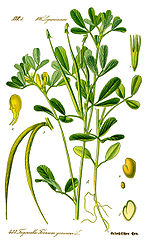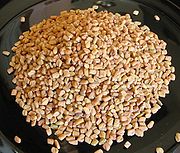- HubPages»
- Health»
- Women's Health»
- Pregnancy
Fenugreek and How to Increase Breastmilk
During my caesarean recovery, I had the unfortunate experience of having itchy skin rashes all over my body, thought to be a side effect of the anesthesia. It was then that I was introduced to Fenugreek.
An Indian friend told me that I can drink some Fenugreek tea to relieve me of my annoying itch. She said that it was actually a custom in the Middle East for women to drink this Fenugreek (also called Helva) tea after childbirth for 30-45 days.
That was interesting. I went ahead and looked up what I can about Fenugreek. I discovered that this herb has a lot more to offer.

What is Fenugreek?
Fenugreek (Trigonella foenum-graecum) is a plant that has many uses. Its leaves are used as a herb and the seeds are used as spice. It is produced widely in India, Pakistan, Argentina, Egypt, France, Spain, Turkey, Morocco and China. However, India is the top producer in the World.
There are 2 common categories of uses of Fenugreek: Food preparation and Herbal Supplements.
- Food preparation - By itself, fenugreek has a bitter taste. It is frequently used in the preparation of pickles, curry powders, and pastes quite popular in Indian cuisine. The young leaves and sprouts are also used to flavor different dishes like Mutthia and Methi. Fenugreek is also used in the production of artificial maple syrup flavoring like Mapleine.
- Herbal Supplements - Fenugreek is being sold today in capsules and
is being prescribed by doctors and alternative medicine enthusiasts as natural herbal supplements for the control of
diabetes and hypercholesterolemia and for lactating women. It can be prepared as poultices as well and are used to treat sores and abscesses. Tea preparations are used to relieve cough and bronchitis.

Fenugreek for Breastfeeding Moms
I've heard many moms say to me that they wanted to breastfeed their baby but was not able to do so because of lack of breast milk. I'm blessed that I had no problem breastfeeding my 5 children because I got enough breast milk to feed them. But for those who have problems with breast milk supply, Fenugreek help is on the way.
Galactagogue is a milk producing agent present in Fenugreek seeds. Therefore, Fenugreek has been recommended as a natural supplement to increase milk supply in lactating women. It was used to be taken in as a tea preparation but because of its bitter, maple syrup-like flavor the seeds are ground to powder form and are now administered in capsules sold in health food stores.
Many breastfeeding moms who took Fenugreek reported an increase in breastmilk production in as little as 24 hours. With this benefit however, those who take Fenugreek in the required quantities (6 capsules/day or approx 3500mg/day) to increase their milk supply notice that their sweat and urine gives off a distinct "maple syrup" odor. Good thing though that once the mother feels that she is producing adequate breast milk, she can stop taking Fenugreek. The milk supply level can be maintained as long as baby breastfeeds regularly.
Aside from increasing breast milk supply, Fenugreek can help moms in 2 other ways. When mom suffers from engorgement and mastitis, it can be applied as a poultice to help with let down and sore spots. Another positive effect of taking Fenugreek is weight loss. In some cultures, it is believed that fenugreek tea can help lose weight. There have been some reports of having lost 3-4 pounds in 2 weeks from the tea alone. That would be great for us moms who gained those extra pounds during the pregnancy.
Caution: Though many breastfeeding moms have seen success in using Fenugreek to increase their breast milk supply, we should take note that it is not for every breastfeeding mother. Though it is regarded as GRAS (Generally Recognized As Safe) by the FDA, there are some side effects reported by women using Fenugreek. Aside from the sweat and urine smells, some other side effects are diarrhea, increased asthma symptoms, and hypoglycemia and uterine contractions, thus best avoided during pregnancy.
More Helpful Information on Fenugreek
Fenugreek Tea Preparation
Boil about a teaspoon of whole Fenugreek seeds in approximately a cup of water for
about 15 minutes. Drink a cup three or more times a day. You'll know if you are drinking the required amount when your sweat and urine begin to smell like maple-syrup.
Fenugreek Poultice Preparation
Steep several ounces of seeds in a cup of water. Let the seeds cool, then mash them. Place them on a clean cloth, warm, and use as a poultice or plaster.
How to Make Fenugreek Tea
Additional Tips When Using Fenugreek
Once you have noticed an increase in breastmilk supply, you can lessen or discontinue the intake of the fenugreek tea. To maintain breastmilk production, simply make sure that you nurse regularly or pump the breastmilk if you don't breastfeed the baby directly.









